Savior of the Voltron Universe
So, in this article I would like to discuss the topic of the Messiah in the Voltron series. I think about it every time I remember that Lance, in an edited version of S8, preached under the tombstone monument to Allura, where he began to talk about some kind of mythical message. Since Allura didn’t die in the original version of the script, this is a clear innovation. Apparently, they really wanted to make a Messiah from Allura, the one who «died for us all».
And to understand the situation, I would like to recall the most famous Messiah of the European world – Jesus Christ. We need it, because there is the image of the Messiah in VLD, the one bringing the words of revelation and the one who deceased in order to save everyone. The analogy is quite straightforward.
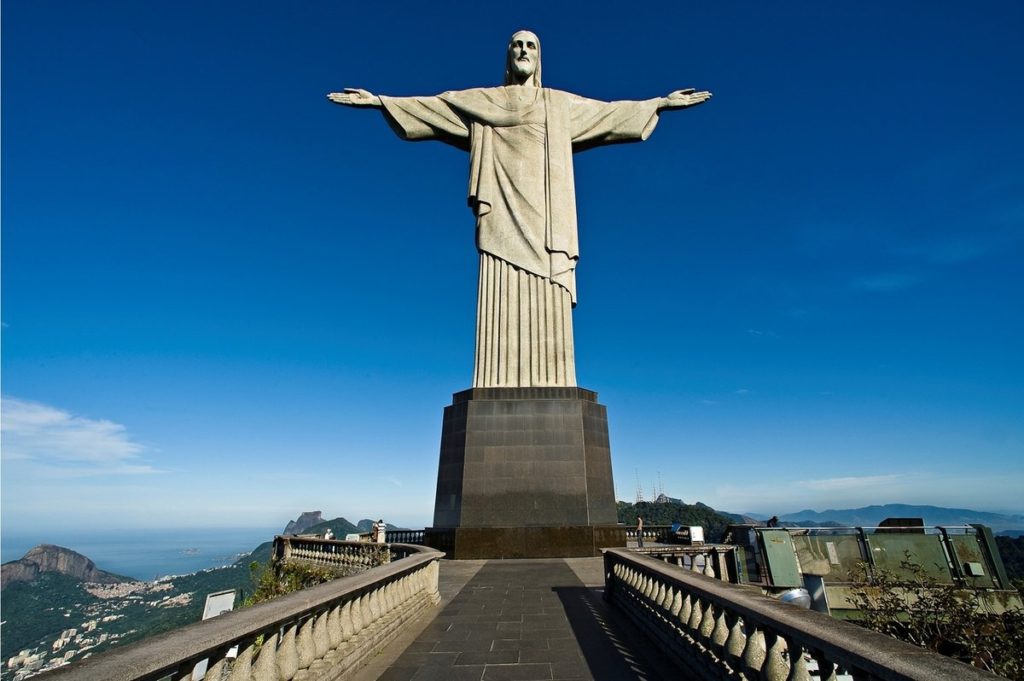

In the end, the topic of Christianity isn’t new to the franchise: in the old series, the heroes professed Christianity (let DotU experts correct me if I’m wrong), and Voltron itself was a supreme being whom the Space Goddess punished for pride (a «beloved» sin in this religion).
The figure of Jesus Christ is very important not only for a religious society, but also in order to mark an important milestone in the development of all civilization. Because Jesus brought the New Testament, which has one small, but cardinal difference from the Old one.
A word about compassion and forgiveness.
The Old Testament was close and understandable to the ancient peoples, since their (and our) favorite «an eye for an eye» constantly slipped through it. You will be rewarded for good deeds, and punished for bad deeds. The New Testament brought a brand new idea: you need to have compassion even for the enemy, and sincere repentance is more important than retribution. Fresh so far, since people even for hundreds of years haven’t been able to understand these truths. The New Testament constantly says that anyone can be forgiven. That you can’t achieve peace in the soul if you accumulate resentment. That it’s necessary to manage conscientiously even with enemies. And one of the most important phrases in it says: a repentant sinner is more valuable than a hundred righteous people who don’t need repentance. It’s easy to guide the true path of those who are already law-abiding and decent. The return of the lost soul to the right path requires much more effort, and therefore is much appreciated.
And I recall this now because Allura, who was shown to us in S8, and in the series as a whole… is very far from all this. And, therefore, I have very big questions about what kind of «message» is carried by her Archbishop Lance.
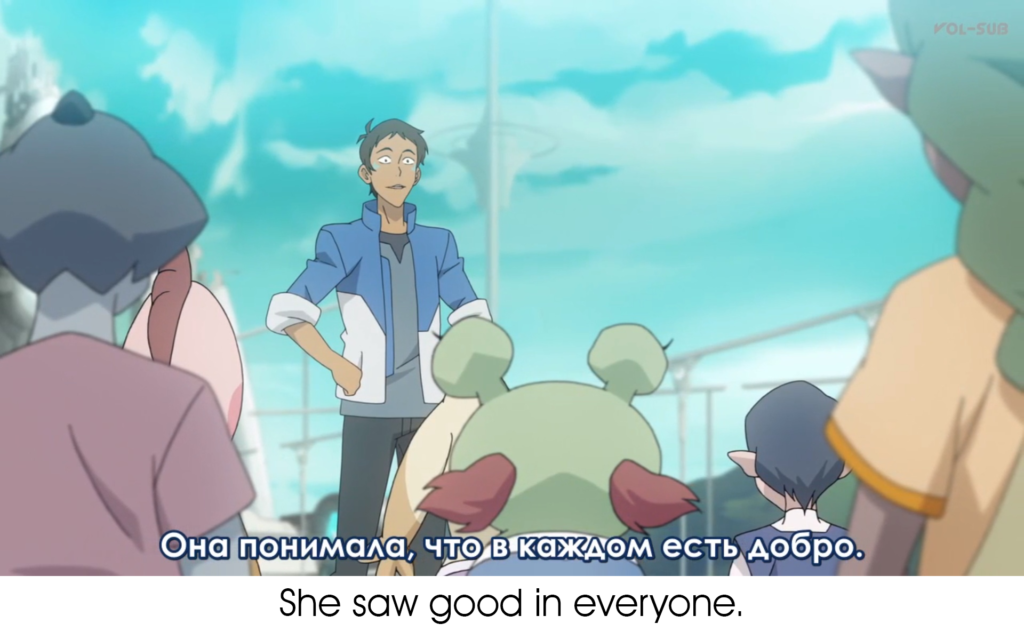
No kidding.
Allura certainly works wonders: she saves people from death, heals, revives. She is a selfless girl, ready for feats for the sake of her friends and civilians of the planets.
But Jesus did not only this. I would even say that all the miracles of Jesus were rather a complement to his basic actions and served as proof of his words, that he wasn’t just a crazy man, riding around on a donkey. And, ultimately, they even did evil service – people were afraid of the abnormality of what was happening and decided to kill Jesus
The main occupation of Jesus was preaching. Exhortations. He spoke to people about compassion and forgiveness. And his words spoken in defense of the harlot were no less valuable to society than the healing of the sick.

And that is… not Allura’s strong point. The beautiful princess doesn’t have compassion for her enemies; she mercilessly punishes «sinners». She’s very categorical in her statements and she likes to label racially, thereby denying the truth suggested by Jesus that no one is sinful by nature.
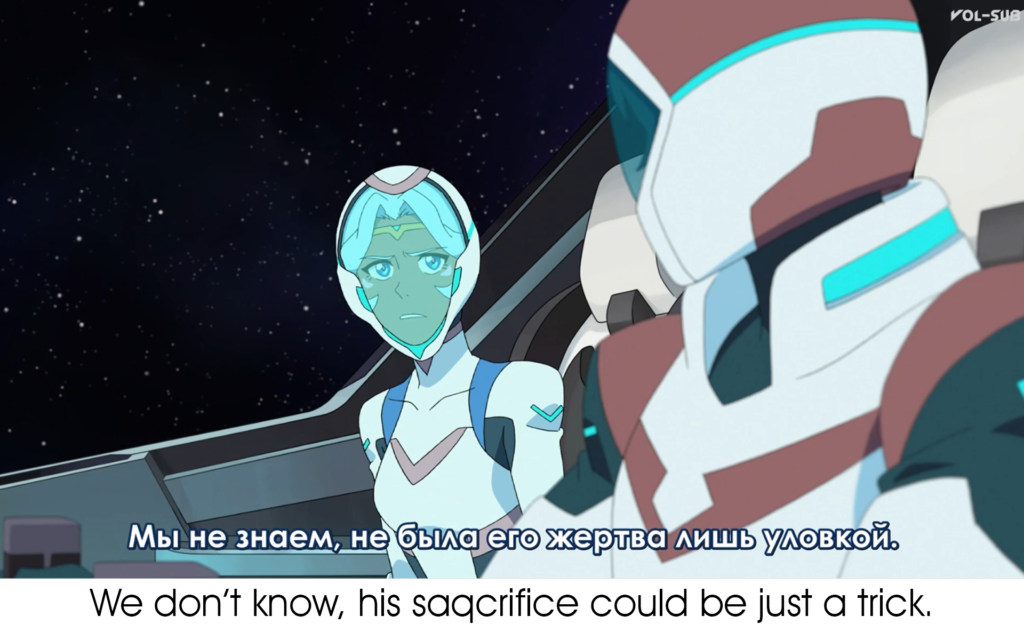

What kind of forgiveness, what kind of compassion can we talk about? Allura didn’t spare her main offender – Zarkon. She cruelly punished him, although he was completely defenseless before her and didn’t remember at all the atrocities that he had committed after the destruction of Daibazaal. How noble of you, princess, to beat a recumbent.
In the original S8, which we didn’t see, Allura just found out that Lotor was dead, and was hysterical, and therefore just broke loose on Zarkon.
In the edited S8, Allura took revenge on her enemy with all cruelty.

Throughout the series (!), Allura never forgave anyone and didn’t show compassion for the enemy. She forgave Keith… for what? Keith did nothing to her, Allura herself had to apologize for her behavior in front of him and the Blades. She forgave Honerva… but Honerva was never her offender, they were simply on opposite sides of the barricades – nothing personal. Moreover, Allura killed the only son of Honerva, and now she «forgives» her.
«Oh, I forgive you for the fact that you suffered a nervous breakdown after losing your son whom I killed»
Thank you very much, Honerva was very grateful for that. Especially for Lotor. So grateful that she committed suicide with joy.
And the problem isn’t limited to this only (although the behavior of Allura in itself already raises big questions).
One of the most important events in Jesus’ life was a forty-day fast in the desert. At the very end of the fast, when Jesus weakened without food and water, the Devil appeared to him and began to tempt him. And the essence of this event is that Jesus persistently overcame temptations, although he was subject to them by his human nature. This is important both religiously and in terms of instructive history in general. Because it’s easy to be righteous when it costs you nothing. Jesus didn’t just steadfastly overcome the trials, showing the triumph of fortitude over base desires. This overcoming was necessary for himself as a person. Jesus, like all people, was faced with doubts and fears. And fear of death as well. And it was the presence of personal experience that allowed him to treat other people’s sins with such an understanding, since he knew how hard righteous actions can be.

To understand means to forgive. Jesus understood people, and therefore forgave them.
But Allura didn’t understand them. Now I’ll explain why.
Surrounded by parental love and care (I would say excessively), Allura grew up in a prosperous greenhouse named Altea among the upper classes and in general, had very naive views of the world for her already mature age (according to my calculations, Allura is at least 20 years old, and most likely 25 years). She was smart and educated, but didn’t know many realities of the life of ordinary people. This is evidenced by her sincere faith in the sanctity of her own people, who «couldn’t do that and never would have become like that» and so on.
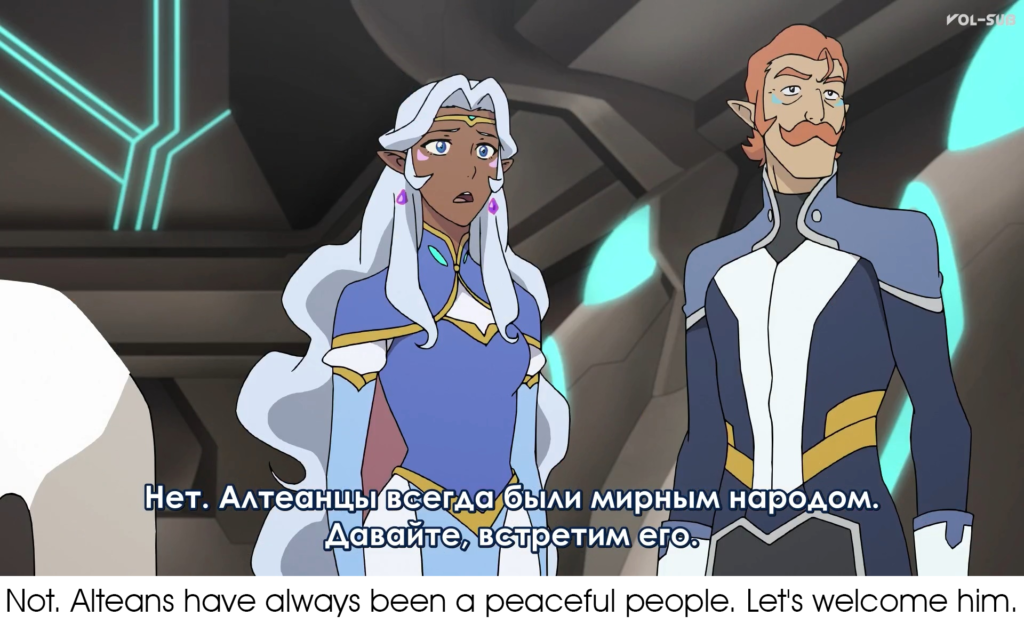
Allura didn’t know and didn’t understand the life of dysfunctional sections of the population, since such people were absent on Altea. For her, confidence in the future was part of ordinary life, not a value for which you even have to kill. She had a clear understanding of right and wrong, but this understanding was largely divorced from reality, which we were shown from the first episodes.

Throughout the series, Allura had to go through a lot. She was literally kicked out of her comfort zone – she was turned from a princess living in a safe Castle into a paladin who constantly risked her life, and this couldn’t but affect her development as a person. But, alas, she never once acknowledged aloud that she was wrong. She has never encountered a morally difficult choice that would make her make a deal with her conscience. In the situation with Lotor, she even made a 180-degree turn, when she believed the words of an Altean who she saw for the first time in her life (it doesn’t matter whether Romelle was right, it’s important that Allura didn’t even think about whether she could support her accusations by evidence).
And looking at this, I want to ask a question: how are you going to teach people if you don’t know life? If you don’t understand people and don’t try to understand them? Jesus understood people, he spoke to them in a language that they understood, he explained his arguments in situations close and understandable to his listeners.
How could Allura teach someone? Actually, she didn’t teach. But the lack of understanding between her and the alleged «sinners» suggests that she couldn’t have done this even if she wanted to.
But back to the temptation of Christ. The Devil tempted Christ three times. And the essence of all his temptations is the temptation of power. Christ, as the Son of God, possessed great power, but knew its worth; The Devil, however, wanted Christ to feel the taste of this power. And where there is power, there is pride. That very pride which led to the fall of the Devil himself and made him a fallen angel.
Moreover, he offered what Christ himself could want:
Do you want to eat? Turn the stones into bread. But Jesus rejects this offer because his fast is more important than hunger. Thus, proving that the human spirit can be stronger than bodily desires.
Do you want people to believe you? Jump from the tower, people will see that you are unharmed, and then they will definitely believe that you are the Son of the Lord. But Jesus refuses to gain the favor of people with tricks. His desire is that people accept and understand (!) his words, not just believe in his divinity and fulfill his every word with the humility of puppets.
And the last – the most important temptation – the ability to achieve your goal quickly and immediately. Take absolute power and create paradise on earth at the click of a finger. Easy, fast and no suffering. But Jesus understood that people can’t be made happy by force. And so he refused.
What’s the case with Allura?
Allura, like many children of her time, grew up on fairy tales about the mighty paladins of Voltron. The lions of Voltron were the creation of her father, whom she admired and whom she imitated. And of course, she imagined how she would become a Red paladin in her turn. For her, Voltron was something omnipotent and perfect, like a father usually looks in the eyes of a small child.
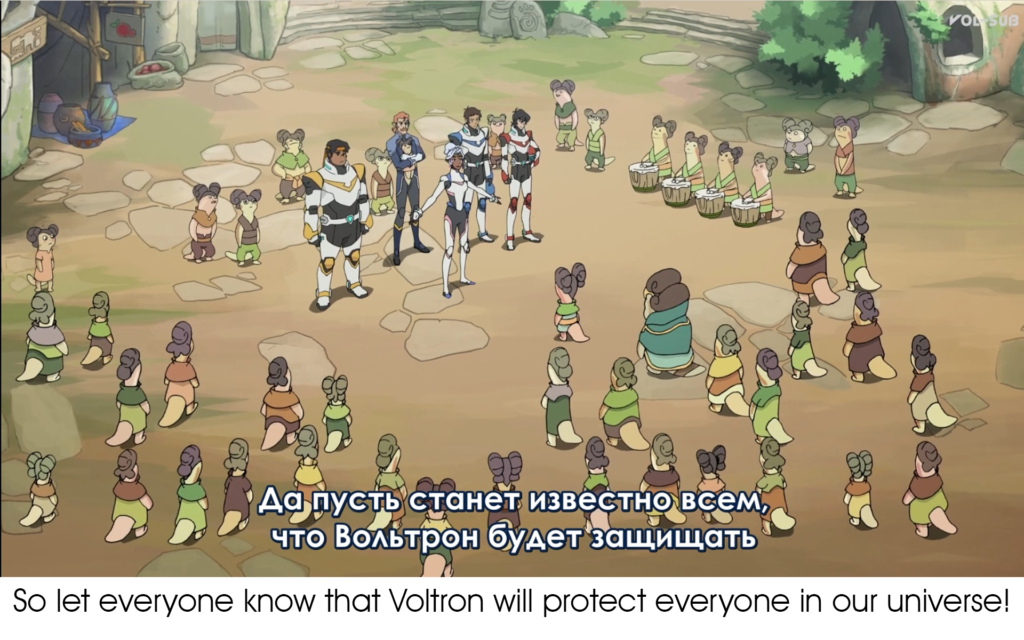
When Allura begins her journey, she declares that with Voltron they will be able to overcome all obstacles and defeat all the villains. She constantly repeats this phrase and turns out to be right. Voltron defeated numerous Galra armies without any problems (although they were beaten by Honerva’s creatures repeatedly, but this thing flies past the paladins’s minds).
Over time, in the eyes of the inhabitants of the universe Voltron gained not just a reputation as a powerful weapon, but as a legend or even a miracle. The main characters even used it as a symbol of resistance – look, we’re paladins, and here is our Voltron! It’s cool and powerful, join us (second temptation? Who knows …). Probably only Honerva was sure that it could be destroyed (however, Honerva herself was more dangerous than all armies).
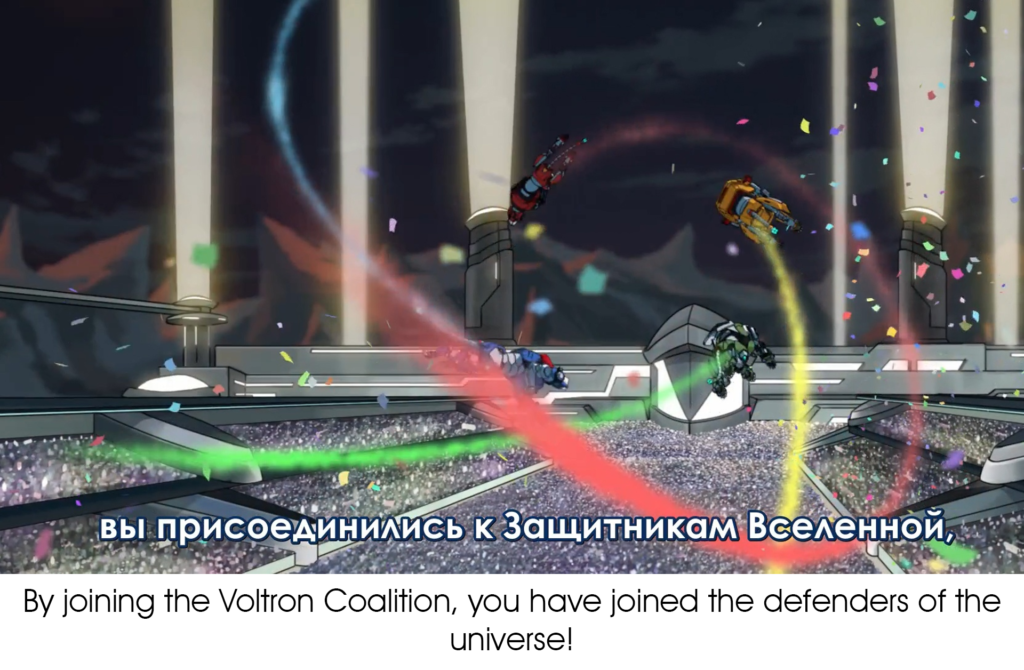
And it so happened that this «most powerful weapon in the universe» fell into the hands of Allura. The temptation, the trial of which… Allura didn’t pass. She really didn’t.
In the reality of VLD which became the basis for the events of the series, Allura had to reckon with other people’s opinions, even with other Galra – the Blades, and this largely cooled her ardor. But we have another reality – where after the death of her father Allura took Voltron and defeated Zarkon with the support of Altea. And this is not some other, wrong Allura. This is the same one, just in different circumstances. In reality, where Altea is alive, surrounded by her «ideal» people, who fully supported (and nurtured?) all her beliefs and aspirations. Having acquired Voltron, that Allura without hesitation began to «do good» in all directions. Join our fair and good Coalition! And we’ll persuade those who don’t want to join by their own will. More precisely, we’ll force them. And those who are especially resistant are safely deprived of their will. They’ll be full and satisfied… vegetables. Good to each of you. And we will have a paradise on earth.
Does it sound like the aforementioned temptation of the Devil? It does.
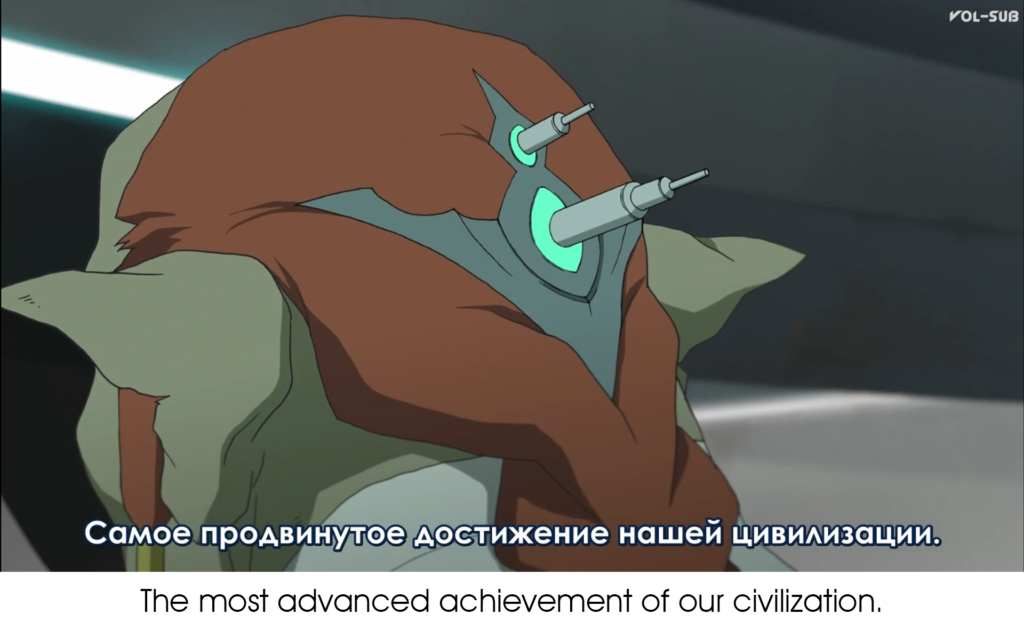
In that world there was no one who would tell Allura that she was wrong. Who would tell her that with such methods she could never achieve peace in the universe. In that reality, Allura literally turned into a fallen Messiah – seduced by gratuitous power and the ability to easily create a heaven, which turned out to be worse than hell.
In our reality, the road of Allura turned in a completely different direction. Voltron really won many victories, but ultimately Allura’s impulse to resolve all issues by force ended in the death of Lotor. Whom she didn’t want to kill at all. To beat, to take out anger and resentment, but not to leave him in the Rift. This decision was made by Keith, as a leader of the paladins.
The loss of the Castle and then the crown knocked out the soil from under Allura’s feet and broke her completely. Allura literally lost everything she had except Voltron and then she realized… that Voltron wasn’t needed. She realized that Voltron wasn’t able to solve all the problems, but she paid too much for it.
The tragedy of this story is that Allura’s path ends on this. She was disappointed in her beliefs, but this disappointment didn’t lead to anything new. There was no rethinking, a new view of the world. Having fallen from heaven, Allura never rose. She didn’t take off.
She crashed.
And the worst thing is that her sacrifice didn’t bring any prosperity to the universe.
Because the universe after these events remained in chaos, despite the happy faces of the paladins in the epilogue. The empire is destroyed, the issue of energy supply remains unresolved. A huge number of planets where political situation is incomprehensible, which condition is unknown. The Galra as scapegoats. Space pirates are at every turn, who are now not afraid of the death penalty at the hands of the empire, and former Galra generals are the first among them. The post-war devastation of a universal scale, where everyone is for himself. And the war for resources between races is a «bright» future for a new world created by the paladins.
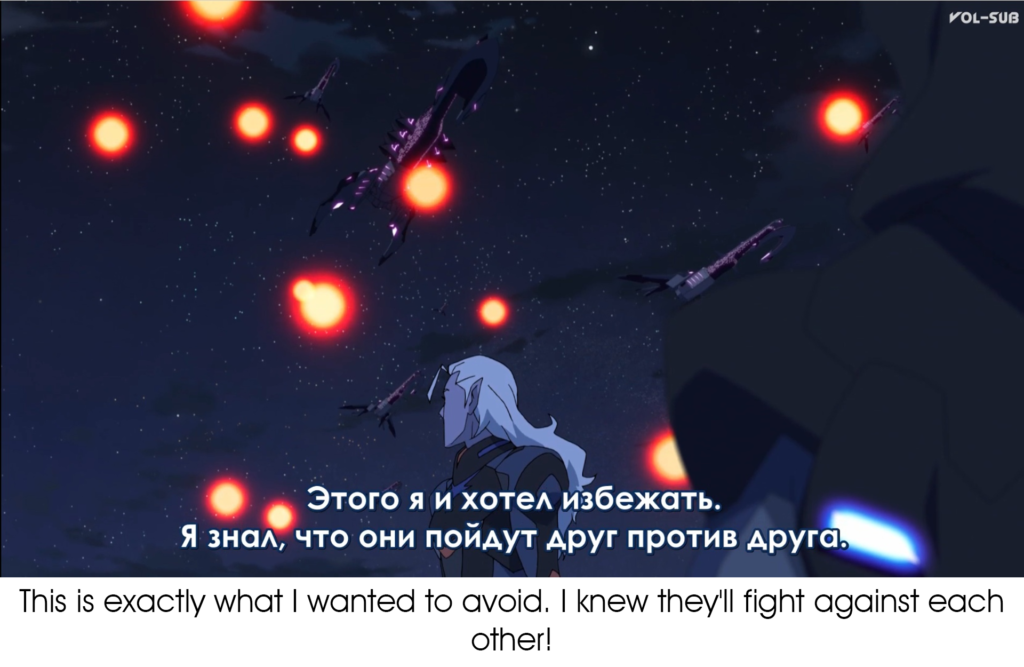
Do you really think that earthlings can and will solve these problems for everyone? The universe will slap earthlings with a spit and grind them into powder with all their ambitions. Atlas and Voltron mechas are gone, no trump cards.
Remember what the dispute between the two delegates in the epilogue was about. About hunger on an entire planet (and maybe even several planets). And how many such planets are now, after the centralized trading system of the empire has been completely destroyed?
The only race where everything is relatively good is the Alteans with their alchemy, to whom Lance broadcasts about the mythical message of Allura. He teaches an absolutely prosperous race, who already knows all these common truths. Of course, because it’s easier and safer than to teach, for example, the Galra. To preach the gallra, simple words on the topic of peace aren’t enough. There you’ll need steel balls steel will, charisma, knowledge of culture and mentality. Ability for oratory.
In the VLD universe, there was only one person who wasn’t afraid to do this.
The one who spoke of peace and diplomacy. That the Galra should respect worthy representatives of other races. The fact that if many Galra act cruelly, it doesn’t mean that they can’t change for the better. Who told Allura right in the face that with her approach to solving problems she was clearly not ready to end the war that she had begun.
Lotor. Oh, yes.

The most interesting thing is that his path began in exactly the same way as that of Allura. And he just as sharply and painfully faced with reality.
Lotor’s childhood and youth were spent on his father’s cruiser, which was probably an exemplary cruiser with elite Galra fighters. Lotor was completely separated from living Galra society, and the only adult with whom he constantly communicated was a governess. This period of his life fell on the first years of the Galra after the destruction of Daibazaal, and his governess – an expert on Galra history and culture – was born and grew up under the old orders. And she specialized in the history and culture of the Galra from the days of Daibazaal.
As a result, Lotor grew up on the legends and stories of the past, which formed his views on the world and his people. As a child, he was proud (!) of being a Galra and respected his father. And it’s easy to imagine what a cultural shock Lotor experienced when he left his father’s ship and was faced with a real state of affairs. It turned out that Lotor, with his notions of right and wrong, didn’t fit into modern Galra society, which grew out of the madness of its ruler. Without realizing it, Lotor became the same relic as those historical chronicles that Dayak told him.
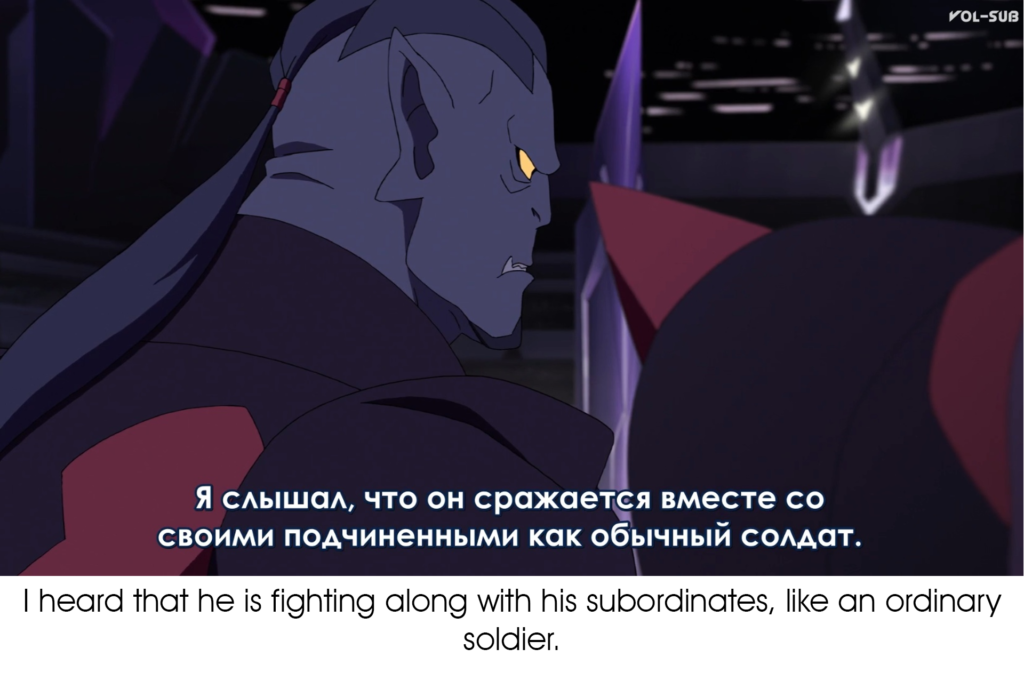
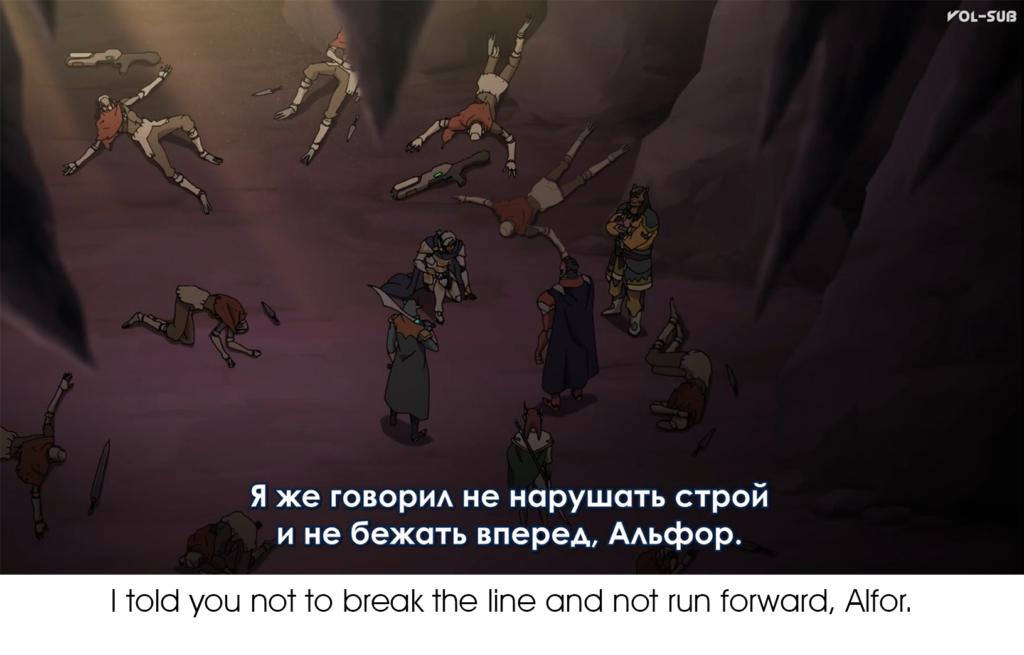
Galra’s old society was built on survival, and this is far from being just a cult of war and martial arts. Daibazaal is shown as a deserted rocky terrain, where even from space it’s difficult to see reservoirs and flora. There wasn’t enough food and water, but there were more than enough people who wanted to eat (according to Dayak, there were many other tribes on the planet). And to compete for these resources with other nations, enormous social cohesion was necessary – the ability not only to fight, but also to form alliances within the species and patiently live together, avoiding contention. And in order to survive with a small amount of food, it was necessary to be able to carefully treat renewable types of resources, as well as sacrifice someone for the sake of the majority if there weren’t enough resources for everyone. And all the principles of Lotor – his practicality, his flexibility, his composure, his ability to find a common language with others – are nothing new for the Galra. Lotor is a typical representative of his people, like the Blades, for example.
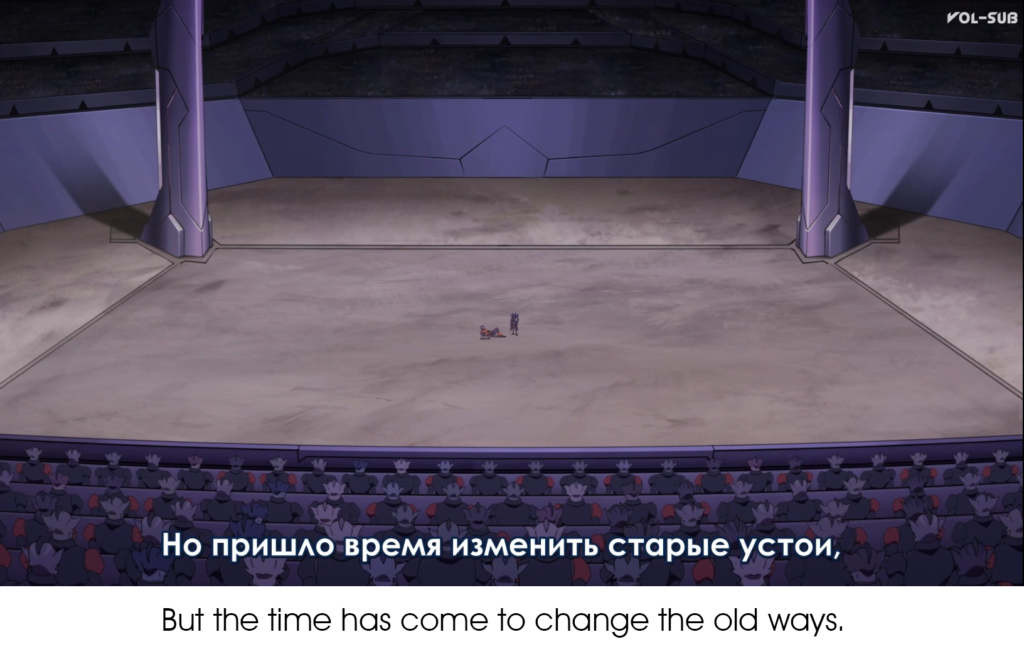
The uniqueness of Lotor as a person lies in the fact that from birth he was raised as a future leader. It’s worth remembering that when it was time to test his skills, he was sent as governor to the planet – that is, even Zarkon believed that this position was the lower bar for his son. And judging by the flashbacks, Lotor always understood that he was a prince and a son of the emperor. Dayak – being a harsh and authoritarian personality by her own nature – raised him as the one who, in her opinion, should lead her people. Whose fate is to light his fire on Kral Zera, and nothing else.
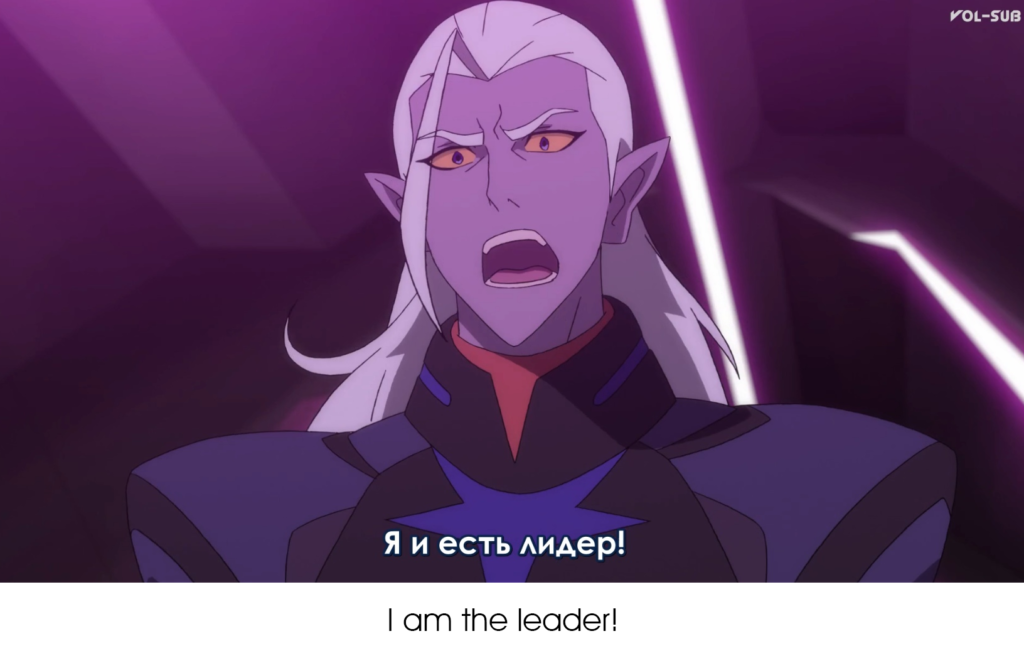
Lotor never doubted who he was or what his fate was. And he understood what his responsibility was. He considered his control of the planet not only as a way to win the favor of his father, but also as an example of his management methods as a whole. In his youth, Lotor believed that his father wasn’t insane, but simply mistaken, and that he could convince him by showing what successes could be achieved with sound government administration. Lotor wanted to direct his achievements in the role of governor for the benefit of the whole empire, hoping to reach out to someone who had a decisive voice in this matter.
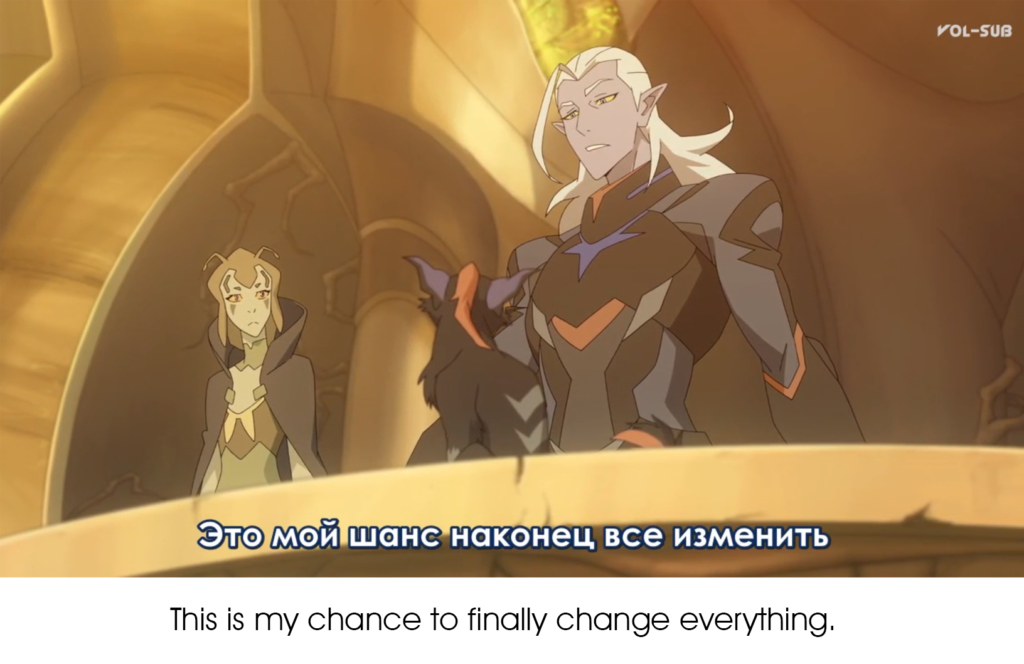
In that naive period Lotor didn’t realize that he was crying in the desert. It’s impossible to shout to those who have lost their ears. Alas, the ruler of the Galra determined the fate of the entire state, so Lotor could only observe in evil impotence how, with a cheerful boom, his people destroy themselves and the rest of the universe.
And already in this we can begin to draw a parallel with the fate of Jesus Christ. He grew in the same way, knowing about his destiny. And in maturity he looked at people with sorrow, seeing that they remained deaf to his words, and knowing that it wouldn’t lead to anything good.

Contrary to opinion about Lotor’s antipathy to the Galra, in reality he never experienced hatred of his people. The source of his rage in the Rift was the endless fatigue from impotence, accumulated over ten thousand years. He was a Galra himself and understood this very well, and it was the feeling of involvement in the Galra people that broke him that way. Lotor felt responsible for the mess that reigned in the universe, as he saw himself as someone who had to rake these Augean stables, and the inability to fulfill his duty caused a quiet malice in him.
But just like Christ, Lotor refused to give up and continued his struggle for common sense within the walls of the madhouse, which the universe became. He didn’t have an omnipotent weapon that could solve all problems at once, so he had to mimic the surrounding society and learn to maneuver between the laws and orders established by his father. Like other generals on the border, he was engaged in the capture of planets, but unlike them he left the peoples their own self-government, allowing them to live as freely as possible within the empire. And I strongly suspect that the whole «capture» came down to diplomatic negotiations, where he offered the peoples voluntary accession to the empire, as a way to protect their planet from plunder. The principle of lesser evil is a habitual method for survival, no matter how unpleasant it may seem.
A separate line was the desire of Lotor to save the Alteans. By the time Zarkon expelled Lotor to the borders of the empire, he already knew about his origin. He knew that his mother was an Altean, and had some information about who she was and what she did.
The desire to save the Alteans had many reasons. And this is not only a desire to save these people in spite of the father’s cruelty (in the first season, Zarkon directly said that he was deliberately engaged in the extermination of the Alteans), and not only a desire to use the potential of Altean alchemy, which was still heard by people at that time. Initially, this desire was born from the fact that Lotor, as a Galra, had a need to be a part of society. Having become an outcast for one of his people, the prince decided to try to find his place in another one. True, as a result Lotor received not at all what he was counting on: in the eyes of the Alteans, he turned into space Moses who took them to the promised land. And thus he saved them from his father’s tyranny – which is extremely amusing if you remember that Moses himself was raised in the family of the pharaoh.


The funny thing is that the Alteans really became the Jews of the VLD universe. Chosen people with secret knowledge. Clear Egyptian motifs can be traced in their architecture, and at the time of great need a prophet appeared to them and led them to where they could live in safety. And they remained faithful to him to the last, and therefore, even despite the temporary reign of the Antichrist (Honevra), they ultimately became the only race that successfully survived all the hardships.
Lotor promised them salvation. And he kept his promise even in spite of death.
Honerva turned into a symbol… rather, not of the Antichrist, but of the anti-Mother of God. As Haggar, she wore an outfit similar to the one she was buried in. And in which she bore a child and subsequently gave birth. And this outfit very much resembles the robe of the Blessed Virgin Mary.


But if the Virgin Mary is the embodiment of altruistic selfless love, then Honevra, having remembered about her motherly feelings, plunged into them with the same rage filled with quintessence like she had previously engaged in science. She was ready to strangle her son with love, destroying everything and everyone in her path. She didn’t even spare her husband. Haggar kept loyalty to Zarkon for ten thousand years, but this loyalty crumbled to dust amid the awakened memories of her son.
And if Jesus loved his mother so much that he used his divine power ahead of schedule for her sake, then Lotor categorically refused to recognize such a «Virgin Mary», and therefore went into the deadly denial of their relations. He couldn’t raise his hand to her, but he was also unable to forgive her.
Lotor’s attitude to parents was, in principle, very painful. And not only with his mother, where it was easier for Lotor to believe in her death than accept that his mother was a ruthless monster. Every child has a need to love his parents, and Lotor loved his father. He was lucky as a child, he practically didn’t communicate with Zarkon and therefore created in his mind a certain image of a harsh, but fair parent. And until the last moment he didn’t believe that his father can do so cruelly with him.
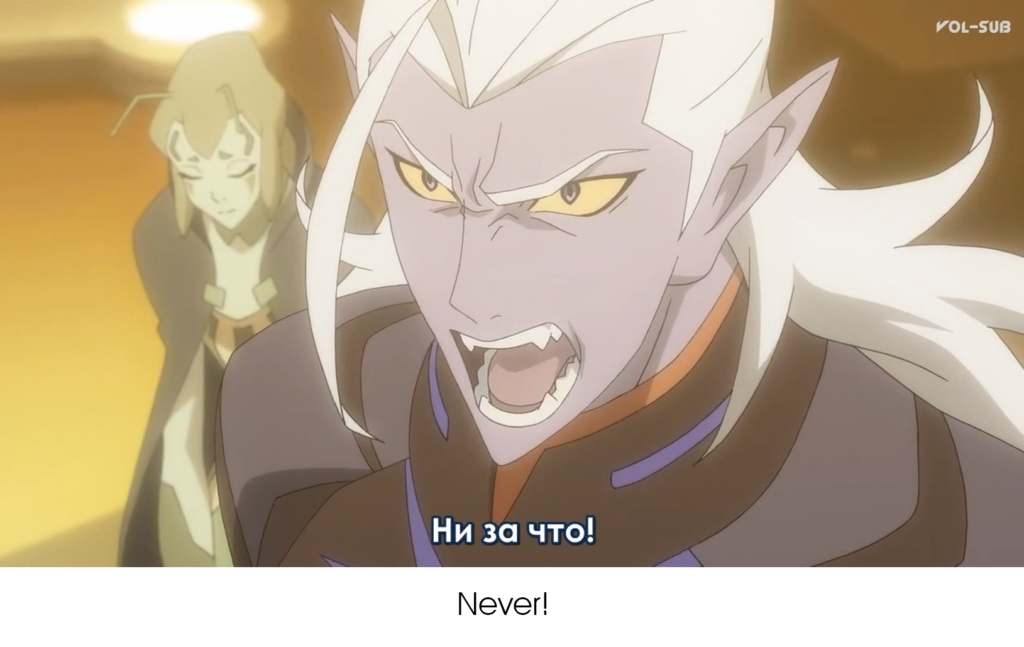
And even after that, having lived ten thousand years, Lotor hardly perceived the father’s blood on his hands, although he had long known that this would happen one way or another.

In the edited S8, Lotor didn’t get a chance to reconcile with his family during his lifetime. Living Lotor could never have so easily forgiven his parents who had turned his life into a nightmare. But in their desire to kill him and make him a scapegoat in a theatrical production named «Lotor is to blame for everything! » the scriptwriters forced him to forgive even his most terrible offenders.

And thus, they only completed the image of a person who can forgive any pain inflicted on him.
Lotor didn’t spare his immediate enemies. War is war, nothing personal. He knew what was at stake, and therefore, without a doubt, got rid of those with whom he couldn’t agree on peace.
But there’s a completely different attitude towards those whom the prince, one way or another, allowed to personal boundaries. And these were paladins, and generals, and even Sendak, oddly enough. Sendak, like Lotor, was born under the old Daibazaal and Lotor respected him for his loyalty and honor. Therefore, Sendak became the only one, except Zarcon, whom Lotor warned about the danger emanating from Haggar. After all, in the end, Lothor was right here too – Honerva used Sendak to weaken earthlings and paladins, and prepare the way for a successful attack of a white mecha.
In relation to the paladins and his generals, the prince showed completely devilish patience and angelic mercy. Both of them wanted to surrender him to Zarkon for mercantile purposes, but he never tried to avenge them. He killed Narti because he couldn’t take a Haggar’s puppet with him, but he didn’t even touch the other generals with his finger. And he didn’t remind the paladins about what they had done to him, as if it was common for him when he was sent unarmed to certain death.
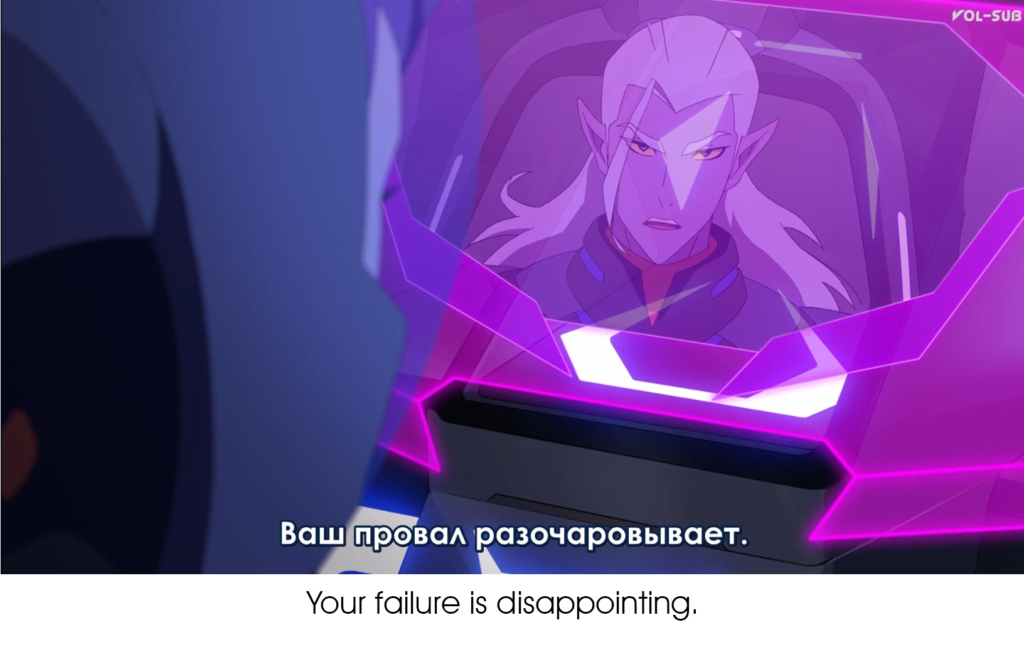
Allura was offended by Keith for his origin, although they had already fought together more than once. Lotor was ready to forgive even betrayal.
He forgave Allura, although she hit him as painfully as Zarkon did in his distant youth. In a fit of rage, he beat Voltron with his fists but couldn’t raise his hand to her.
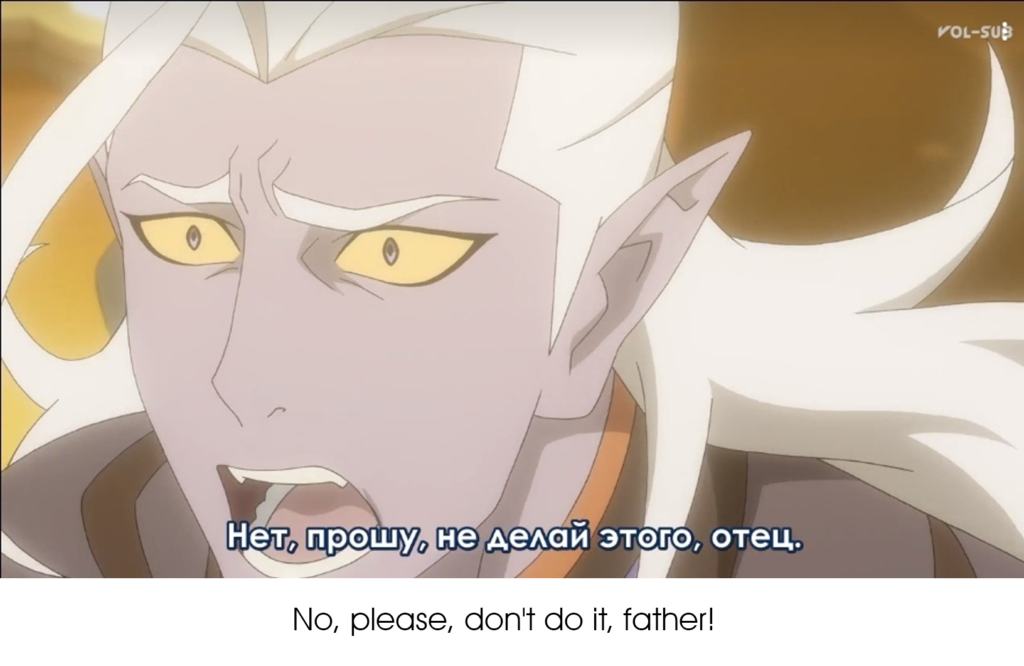

Forgiveness was a symbol of Jesus.
Forgiveness has become a symbol of Lotor.
For ten thousand years, Lotor was tired of living in the nightmare of eternal war. He wanted to wake up.
But the paladins, who had tasted the fury of the battle — the children who had gained tremendous power and felt thirsty for blood — turned out to be lousy allies. For them, the war had just begun, and they enjoyed their victories.
What resulted in an extremely deplorable way.
They refused to listen to the man talking about peace, because all the looks were drawn by a brawler, demanding bloody revenge. And the paladins, like dogs, tore him up without thinking about the consequences.
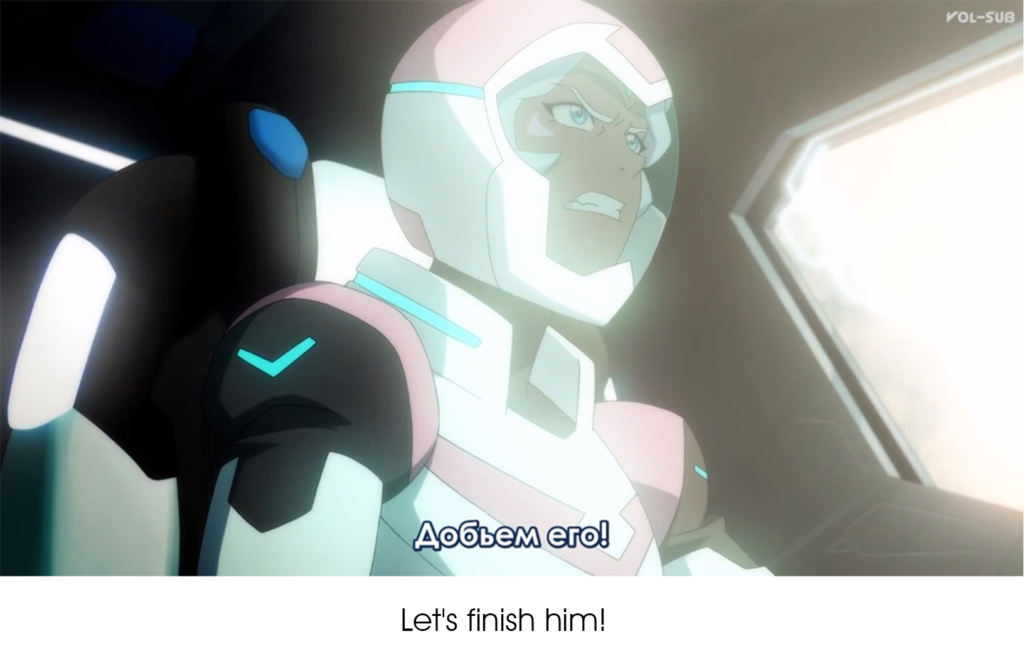
He was killed on the tip of the Altean traitor, as an enemy of the universe. Jesus was crucified on the cross as a thief on the tip of a Jew, Judah.
There’s even a resemblance to this.
But then here comes a huge BUT.
Jesus was God, death for him was only a transitional moment – liberation from the shackles of the flesh. Having died and resurrected, he «trampled death» and atoned for the sins of all people by opening the way to heaven for them.
But Lotor in the series which we were show, didn’t rise again. For this Osiris there wasn’t his Isis, who would collect him in pieces and resurrect.
And the VLD universe became the universe of the not risen Messiah. Death began its harvest and then went with a scythe for all the rest. Millions, if not billions, died after Lotor’s death.
I hope Romelle is happy with her revenge.
You know, in reality with Lotor but without Voltron the universe was bad, but somehow survived. There was resistance, there were the Blades, there was Lotor himself with his strategy for the peaceful capture of the planets and plans for the exploration of quintessence. Quite a good life comparing to an alternative reality with Empress Allura and her army of «vegetables».
But now this reality has also lost Lotor. The universe is head over heels in shit, and no one imagines how to rake it, because the main cesspool worker was sent to the furnace. The problems are for years if not not for decades.
And we can only rejoice that the wunder-waffle was taken from the earthlings. Oh yes, they would have set up ideal worlds. They’re already trying to teach the Galra the principles of democracy. They instill their morality into a people whose culture is several times older than the entire earthly civilization.
This is not a happy ending. This is a tragedy of universal proportions.
And the joy of the paladins among this mess looks like a real farce. They were scattered in different parts of the world, and they’re only going to stand with smiles near the tomb of Allura. The perfect ending to a strong friendship.
Even this friendship died with Lotor. After all, this is the universe where death won.

And now I have to remind you that here and now we’re discussing not a Japanese tragedy where «everyone die», and not even a fan fiction written by some angst lover. This is an animated series for children. And in our times, it’s the visual content (movies, games, cartoons) that creates modern myths that people need so much to satisfy the need for emotions and impressions that are lacking in a gray and often difficult life.
And you know… this is the first myth I remember that ended … so bad.
In all the myths – those that over time became an integral part of the culture of people – for hundreds of years, the same ending passed through. Not the triumph of good heroes over the bad ones, it was just not important, but the triumph of some justice.
Because all people, when they go to watch a movie, buy a game or take a book, they want the story to end… right. Not good or bad, but right. Because there’s enough unfair stories in real life.
And we can trace the stunning trends: the failure and indignation of the audience cause precisely those stories where the routine was broken. For the sake of creating an artificial wow-twist, for the sake of money, or simply because of the writer’s curvature, it doesn’t matter. It’s important that after such an ending people have a feeling… that they were robbed. That they got the wrong emotions for which they went to the cinema / computer / library.
I must admit that I am a member of the so-called Happy End Club. I don’t like horror games without the opportunity to get a good ending, because I think that then the game turns from an interesting story into a scarecrow attraction, where you know in advance how it will end.
But after all, modern animated picture isn’t just an attraction with cool effects. Yes, the cinema has long been supplying this type of content (and trying to keep up with its profitability it has spoiled a lot of good stories), but it won’t work with animation. An animated movie or series is that rare type of contemporary art, from which history is expected first, and then a picture.
And therefore, when serious plot mistakes are made in the animation, it immediately catches the eye. In the animated pictures, like in the books, the lousy plot can’t be covered with cool effects or screamers.
And in the case of Voltron, the most painful thing is that the story is… good. It’s well-written, it’s thoughtful. It’s drawn by wonderful animators who not only made people move on the screen, but made it so that the entire visual works to tell this story. And you look at it and think that these guys just can’t screw up. That they’ll complete the story on the note that was there throughout the series. There’s tragedy in this note, but it invariably led to a sense of hope. That everything will end well.
But instead, we got paladins mimicking a dog sitting in a burning room.

When in ancient times people began to create myths, they did it without any back thought. They came up with plots as demanded by their souls and the collective mind of society, and they composed enough so that all modern stories would somehow repeat what was invented centuries before us. This is neither good nor bad, it just means that we need psychologically to have stories end this way.
And Voltron’s authors are unlikely to be religious, perhaps they didn’t even understand that they «plagiarized» biblical myths. And in their thoughts directed to write a good story, the gods of life had to defeat death. Because, howcan it be otherwise? This is a story for children, and this is a reboot of Voltron after all. Five heroes in colored costumes have always triumphed over evil thanks to strong friendship and personal prowess, and here they also have robotic cats. Everything should get better with cats!
Lotor knew how to get out of the crisis with the least loss for the people, but he didn’t have the opportunity to realize his plans.
Allura had this opportunity, but she didn’t know how to use it.
And they could help the universe, but only together.
Children raised far from real life and crashed with a bang about harsh reality. Both of them had nothing left but dreams of the past, long lost and forgotten in the current era.
Longing for a world lost ten thousand years ago. A world that no one remembers. This is what united these very – very different people. When you don’t need to explain to each other «What are you missing for happiness?» because each of them feels the same.
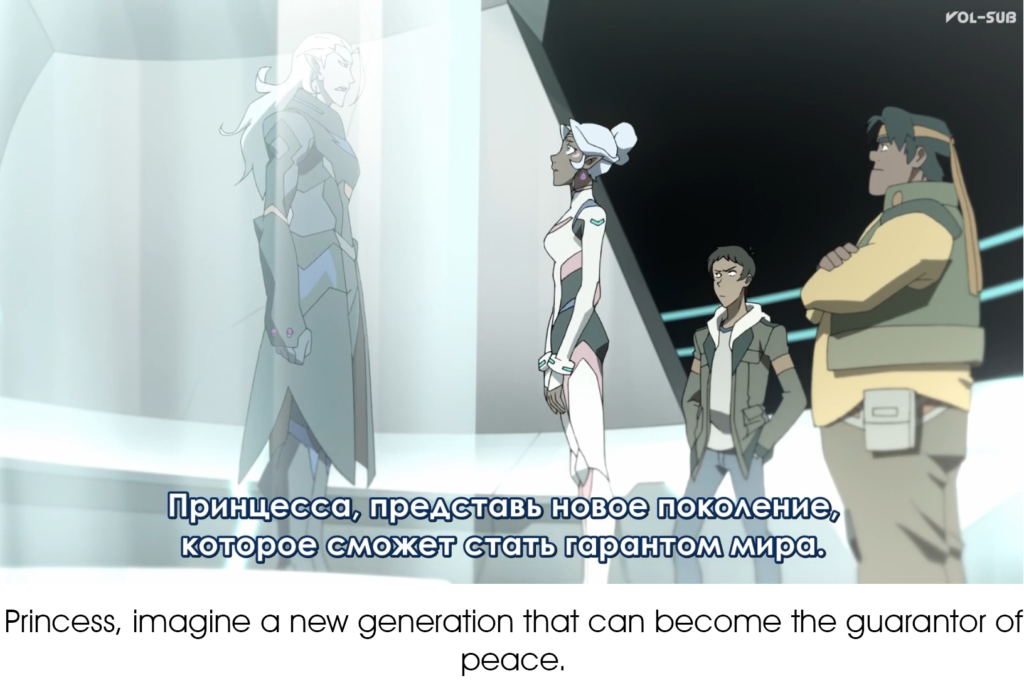
That is why when Lotor and Allura become something more than just people, they return Altea and Daibazaal.
Because this is what they always dreamed about. Yes, they won’t be able to build that ideal world from their dreams, but they can try to recreate everything as it was, only better. Better for everyone. If you can’t restore the old, then build something new on the ruins.
And that is exactly what would be a perfect ending. When the flame of war fades, and flowers grow among the ashes. In a good story for children it shouldn’t be otherwise.
Because this is exactly what makes us put up with death. Because in a good story, at the end, there should be not a man who has lost heart and dropped his hands, but a man who looks with hope to the future.
A man who is planting flowers in the ashes. God of life who trampled death.
And if the entire universe became the ashes, then we need an appropriate gardener. Fortunately, such a person was found in the real story of Voltron.

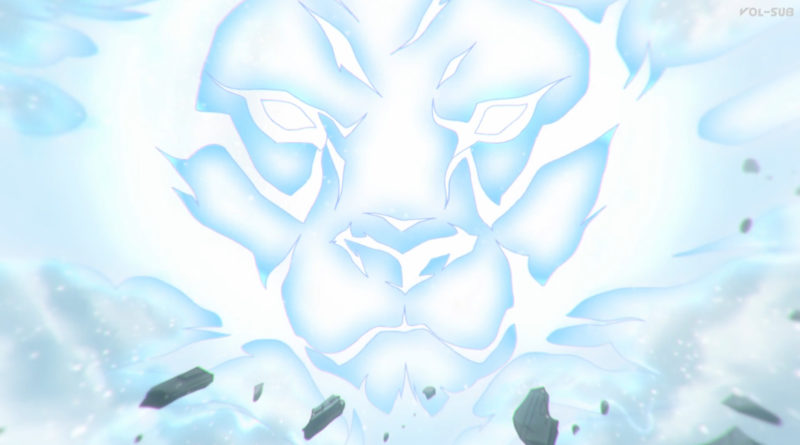
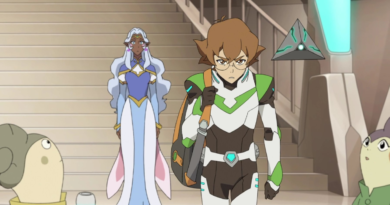
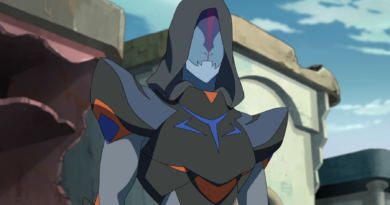
Es el mejor análisis de todos! viva lotor
I know this comment is almost 2 years late after your published article, but thank you, Nadezhda, for such a powerful analysis. This article and the one about the heroine’s journey just touched all my strings. THIS explains exactly why we all crave a different ending, the right resolution. Not everyone is Christian in the VLD fandom, but almost all of us have been raised in a world infused with Christian moral values that perpetuated for 2 millennia: compassion, forgiveness, opportunity for repentance. We hold these values true in our genes I could say, they’re part of our internal structure.
Being raised in a Christian family, I can relate to the Old vs New Testament comparison. My mother had an extensive library of patristical books and she enjoyed reading religious commentaries. We often found ourselves discussing and analyzing different passages from the Bible. I remember talking about the main differences between Old and New Testament, and it’s exactly what you pointed out in this article. These concepts remained with me from our family conversations: Old Testament was about retribution, eye for an eye, live by the sword, die by the sword. Death is a punishment for sins, a way to purge the world of evil. The New Testament comes and wipes away the sins, with Jesus’s love and compassion, with forgiveness. Death gets replaced by resurrection (Allura bringing others back to life should ring a bell)
In my opinion, what happened with VLD is that they started strong with New Testament values, with a heroine’s arc, with Lotor’s messianic arc, they created the anticipation, we were all geared up for it, subconsciously expecting the Christian fulfillment of the arc… But then… the grand finale comes… and bam!!! they closed unapologetically with cruel Old Testament punishments. The sins have no room for atonement; death is the only way. Sword for sword. Cherry on top: even the good guys die in the process. And the ones remaining alive become diluted versions of themselves (or worse, fake versions).
Actually, Japanese anime from the 80’s employ this capital punishment technique, from what I’ve seen. Correct me if I’m wrong. The bad guys get punished by death. The good and the evil forces fight sequentially, episode by episode, until the final retribution comes in the grand finale, when the evil gets purged and harmony is restored through a grand battle. Sometimes, the good hero dies as well, as a dramatic, selfless, honorable act of sacrifice.
Another 80’s anime series owned by WEP is “Saber Rider and the Star Sheriffs”, originally titled “Sei Juushi Bismarck” in Japanese. It’s basically the little sister of Voltron, a space western anime show that tanked with the US audience, but had quite a popularity in other countries, including Germany. The original Japanese show follows exactly the dynamic I just described above. Death is common. Evil must perish. The American adaptation, ‘Saber Rider…’ created new episodes, made in the US studios, that add more nuance to the characters, and they softened the narrative, they even added a redemption arc to one of the bad characters, Vanquo. Overall, they eliminated the death punishment from the series plot (the enemies, instead of dying, are “vaporizing” into a different dimension, so they can come back multiple times). So, one could say they sort of baptized the show into a more… Christian vision. In the end, though… bummer… again, a merciless closing. Just as Lotor seems to be cursed, his counterpart Jesse Blue follows the same fate, no chance for redeeming. Heck, Lotor and Jesse even look and act similarly, and have similar lines, occasionally: “I thought you’d be glad to see me” says Lotor in Allura’s dream, and Jesse, while luring his love crush, April, into a trap.
WEP seems to enjoy this kind of Old (Fashioned) Testament narrative. It sells toys for boys and their dads, apparently. I bet it would sell many more toys (including for boys and their dads, but not exclusively for them) if the tale would adapt to the 2020’s.
Thank you for this beautiful analysis! I have two things I’d like to add to this comment section..
1. This ties in to my favorite JRR Tolkin quote: “all story’s reflect the great story”, this is constantly becoming more apparent to me and you’ve proved that yet another seemingly unchristian piece of media truly does reflect the gospel and great story of Jesus Christ in a real way.
2. This isn’t to come against you or anything, perhaps you made a mistake or I’m reading it wrong. As someone who studios theology and knows many theology experts I believe that “ She’s very categorical in her statements and she likes to label racially, thereby denying the truth suggested by Jesus that no one is sinful by nature.” The Bible (which is the word of Jesus) is clear that we do indeed have a sinful nature. Galatians 5:17, Jeremiah 17:9, Romans 7:18. My favorite is Ephesians 2:3 “Among whom we all once lived in the passions of our flesh, carrying out the desires of the body and the mind, and were by nature children of wrath, like the rest of mankind.” Yeahhhhhh.
Anyway thanks for this incredibly well thought out pice of writing I throughly enjoyed it!
Let’s go TEAM PURPLE LION